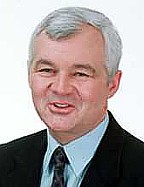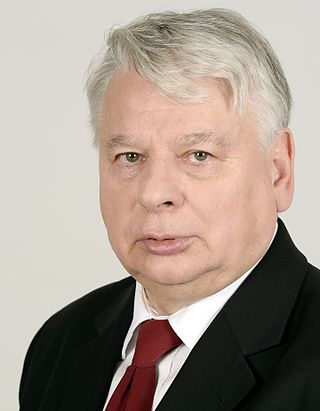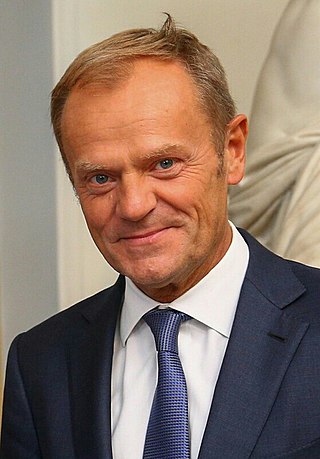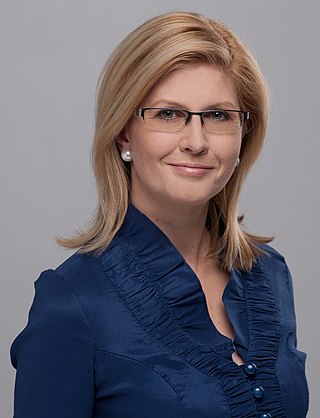Civic Platform is a political party in Poland. It is currently led by Donald Tusk.

The president of the Council of Ministers, colloquially referred to as the prime minister, is the head of the cabinet and the head of government of Poland. The responsibilities and traditions of the office stem from the creation of the contemporary Polish state, and the office is defined in the Constitution of 1997. According to the Constitution, the president nominates and appoints the prime minister, who will then propose the composition of the Cabinet. Fourteen days following their appointment, the prime minister must submit a programme outlining the government's agenda to the Sejm, requiring a vote of confidence. Conflicts stemming from both interest and powers have arisen between the offices of President and Prime Minister in the past.

From 1989 through 1991, Poland engaged in a democratic transition which put an end to the Polish People's Republic and led to the foundation of a democratic government, known as the Third Polish Republic, following the First and Second Polish Republic. After ten years of democratic consolidation, Poland joined NATO in 1999 and the European Union on 1 May 2004.

Self-Defence of the Republic of Poland is a nationalist, populist, and agrarian political party and trade union in Poland. Its platform combines left-wing populist economic policies with religious conservative social policies.

Law and Justice is a right-wing populist and national-conservative political party in Poland. Its chairman is Jarosław Kaczyński.

Lech Aleksander Kaczyński was a Polish politician who served as the city mayor of Warsaw from 2002 until 2005, and as President of Poland from 2005 until his death in 2010. Before his tenure as president, he previously served as President of the Supreme Audit Office from 1992 to 1995 and later Minister of Justice and Public Prosecutor General in Jerzy Buzek's cabinet from 2000 until his dismissal in July 2001.

The League of Polish Families is a social conservative political party in Poland, with many far-right elements in the past. The party's original ideology was that of the National Democracy movement which was headed by Roman Dmowski, however in 2006 its leader Roman Giertych distanced himself from that heritage.

Roman Jacek Giertych is a Polish politician and lawyer; he was deputy prime minister and minister of education until August 2007. He was a member of the Sejm from 2001 until October 2007 and the chairman of the League of Polish Families party.
Poland has a multi-party political system. On the national level, Poland elects the head of state – the president – and a legislature. There are also various local elections, referendums and elections to the European Parliament.

Parliamentary elections were held in Poland on 25 September 2005. Thirty million voters were eligible to vote for all 460 members of the lower house, the Sejm and all 100 members of the upper house, the Senate.

Presidential elections were held in Poland on 9 October and 23 October 2005. The outgoing President of Poland, Aleksander Kwaśniewski, had served two five-year terms and was unable to stand for a third term. Lech Kaczyński defeated Donald Tusk to become President of Poland.

Jan Krzysztof Bielecki(listen) is a Polish liberal politician and economist. A leading figure of the Gdańsk-based Liberal Democratic Congress in the early 1990s, Bielecki served as Prime Minister of Poland for most of 1991. In his post-political career, Bielecki served as president of Bank Pekao between 2003 and 2010, and served as the president of the Polish Institute of International Affairs between 2009 and 2015. Since the early 2000s, Bielecki has been a member of the Civic Platform party. In 2010, the Warsaw Business Journal described Bielecki as one of the most respected economists in Poland.

Radio Maryja[ˈradjɔ maˈrɨja] is a religious and political socially conservative Polish radio station. It was founded in Toruń, Poland, on 9 December 1991, by the Redemptorist Tadeusz Rydzyk. The name "Maryja" is a traditional Polish form of the name "Mary", referring to the Virgin Mary.

Bogdan Michał Borusewicz was the Marshal in the Polish Senate from 20 October 2005 to 11 November 2015. Borusewicz was a democratic opposition activist under the Communist regime, a member of the Polish parliament (Sejm) for three terms and first Senate Marshal to serve two terms in this office. He was Acting President of Poland for a few hours in 2010.

Grzegorz Juliusz Schetyna is a Polish politician who has been Leader of Civic Platform and Leader of the Opposition from 26 January 2016 to 25 January 2020. He has served as Minister of Foreign Affairs of Poland from 2014 to 2015, Marshal of the Sejm from 2010 to 2011, Acting President of Poland 2010, Deputy Prime Minister of Poland from 2007 to 2009 and Minister of the Interior and Administration 2007 to 2009. He has been a Member of the Sejm from 1997.

Presidential elections were held in Poland on 20 June 2010. As no candidate received a majority of votes in the first round, a second round was held on 4 July 2010. Bronisław Komorowski, the acting President of Poland and vice-chairman of the Civic Platform, defeated Jarosław Kaczyński, twin brother of recently deceased President Lech Kaczyński and chairman of Law and Justice. The global financial crisis, flooding in Poland and the Smolensk disaster were the main themes in the last months of the election campaign.

Parliamentary elections were held in Poland on 21 October 2007, after the Sejm voted for its own dissolution on 7 September. The election took place two years before the maximum tenure of four years, with the previous elections having been in September 2005. The early elections were a result of serious allegations of massive corruption on the part of Andrzej Lepper, leader of the Self-Defense of the Republic of Poland, whose party served as a junior coalition partner to the government of Prime Minister Jarosław Kaczyński. All 460 seats in the Sejm and all 100 seats in the Senate were up for election.
The history of trade unions in Poland started in 1869.

Parliamentary elections to both the Senate and the Sejm were held in Poland on 9 October 2011. The previous election, in 2007, resulted in a Civic Platform–Polish People's Party government. All seats of both Houses were up for re-election.

Iwona Ewa Arent is a Polish politician and political scientist, member of the Sejm of the 5th, 6th, 7th, 8th and 9th terms and a delegate to the Parliamentary Assembly of the Council of Europe.


















